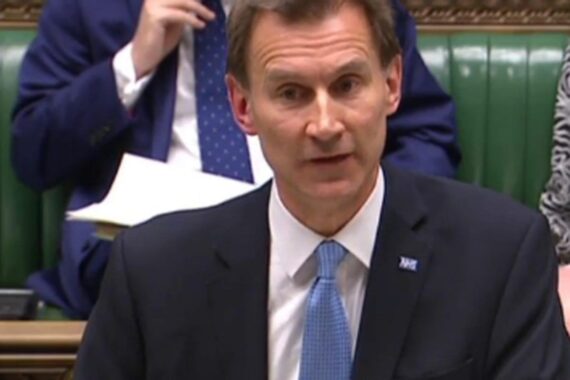No new GP funding announced in Autumn Statement

As expected, there was no mention of additional money being invested into general practice in today’s Autumn Statement.
Earlier this week, the RCGP had called on the Chancellor to address ‘unsafe’ GP premises with a cash injection of £2bn.
Among few measures to affect GPs, chancellor Jeremy Hunt announced he will cut the main rates of National Insurance for employees.
The two-percentage-point cut to Employee National Insurance from 12% to 10% will come into effect from January next year.
According to the statement, a junior doctor on £63,000 will receive an annual gain of over £750 thanks to the cuts, while a senior nurse with five years of experience on £42,618 will receive an annual gain of £600.
Mr Hunt said: ‘Today I’m going to cut the main 12% rate of employee national insurance – if I cut it by one percentage point to 11% that would be an extra 225£ in the pocket of the average worker every year.
‘But instead I’m going to go further and cut the main rate by two percentage points from 12% to 10% – that change will help 27 million people.’
Mr Hunt also announced the Government are cutting the main rate of Self-employed National Insurance (Class 4 NICs) by one percentage point from 9% to 8% from April 2024.
From 6 April 2024, self-employed people with profits above £12,570 will no longer be required to pay Class 2 NICs.
AISMA board member Andy Pow said that GP partners and locum doctors would save £192 a year from the abolition of Class 2 NICs, and also benefit from a 1% cut in Class 4 NICs on profits between £12,570 and £50,270 from 6 April 2024.
For a self-employed GP on £50,000 this will mean a saving of around £375 a year in Class 4 NICs, Mr Pow said.
He added: ‘The 2% cut in the main employee NIC rate from 6 January, coming three months earlier than the self employed reduction, will benefit salaried employees and other staff members. For a salaried GP on £50,000, this will mean a saving of around £700 a year.
‘The bigger picture, however, is that because income tax thresholds remain frozen until 5 April 2028, more people are paying more tax at higher levels.’
It was also announced as part of the statement that the Government is taking steps to reform the fit note process to support more people to resume work after a period of illness, as well as expanding the NHS Talking Therapies programme.
King’s Fund chief analyst Siva Anandaciva said: ‘Today’s Autumn Statement appears to have offered nothing significant beyond the relatively small amount of additional funding for the health service recently announced, which we cannot pretend will be enough for the NHS to do everything needed to give patients the care they deserve and expect this winter.
‘The Government’s NHS funding announcements have now become caught in a vicious cycle of inefficient emergency cash injections and unrealistic expectations of what the NHS can deliver in return.
‘To avoid the NHS facing a crisis every winter, ministers need to make long-term decisions that can bring demand, capacity, and efficiency back into better balance.’
Alec Collie, head of medical at Wesleyan Financial Services, the specialist financial services provider, said: ‘It is very welcome news that the Chancellor has cut National Insurance which will provide welcome relief to medics during this current cost of living crisis.
‘But today was a missed opportunity. The removal of the higher income threshold would have made a significant difference to doctors.
‘The effective tax rate of over 60% acts as a disincentive for doctors to do extra work or overtime. This change could add further capacity into the NHS.’











